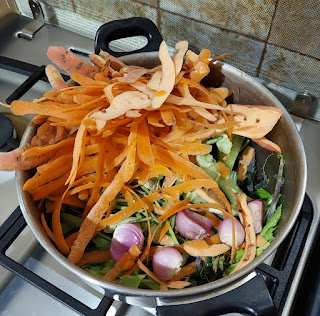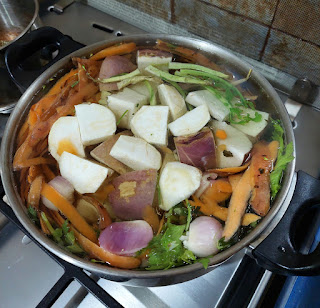6 Adar 5782.
MasterClass has been such a fun and relatively affordable way to fill the seemingly endless time at home created by our nearly two-year (so far) “adventure” of COVID-19.
I started taking the classes to learn
from writing greats such as Dan Brown, David Baldacci, Margaret Atwood, Neil
Gaiman, Joyce Carol Oates, and Amy Tan. A surprise benefit was taking classes
from many other experts in their fields, including chefs Roy Choi, Yotam
Ottolenghi, and Gordon Ramsay. Each chef taught me remarkable things about
making my kitchen a more effective launchpad for excellence.
Ramsay grew up poor. So a leitmotif in
his classes is not. wasting. anything. Ever. When I think of everything I have
thrown away that was viable food...! Well, spilled milk, and all that. Now, I
am enlightened, and we are saving oodles of money, and “making our carbon
footprint smaller,” whatever the heck that means. (I’m joking, I’m joking.
Please don’t send me articles on what “carbon footprint” means. Thank you.)
This recipe was born of frustration and the slowly dawning realization that I did not need to remain a victim of said frustration. I often use Imagine Vegetable Broth for recipes. It doesn’t have sugar, as do so many other prepared broths. But it costs between 30 and 50 shekels for 32 ounces (946 ml), depending on where you can find it, and you can’t always find it. So, after I whined for a while... I decided to do what I always do when I can’t find a product easily: I make it from scratch. With that in mind, I will share with you my recipe for Garbage Vegetable Broth, without sugar or ridiculous amounts of sodium, and as organic and as low-carb as you want it to be.
Save up those carrot peels, sweet
potato peels, onion skins, celery leaves, kale and parsley and dill stems. If
you really don’t want to use the broccoli stalks and cauliflower leaves for
your kugel or roasted veg recipe, don’t throw them in the shemitah bin (this
year, or the compost or trash in non-shemitah years). Save them in bags in the
fridge or freezer until it’s time to make broth (meaning you have enough
detritus with which to brew it).
I like to add other vegetables. Today I added scallions, garlic, celery root, and turnip. Cover your collection of garbage with water and bring to a boil. Add salt and any other spices and any herbs that you like. I added pepper, oregano, thyme, and rosemary. Then I let it simmer for a few hours, adding water to keep the pot full.
When the vegetables have given their
all, I strain the liquid from the vegetables which now can be
thrown in any of the various waste receptacles previously mentioned.
If you’re living in Israel, here’s
another tip: I just started doing business with Farm to Family, “Where Quality and Service Meet.” I am very
impressed with their service (online, phone and delivery), with their
commitment to shemitah and to supporting local farmers, and with their produce
(and other products). They have an easy-to-use English site for those of us
still struggling with our Hebrew.
Save money! Ensmallen your smudgy
little carbon footprints! And feel really good about making your own vegetable
broth, and telling the kids it’s made of garbage. 😂 Kids like eating garbage.


